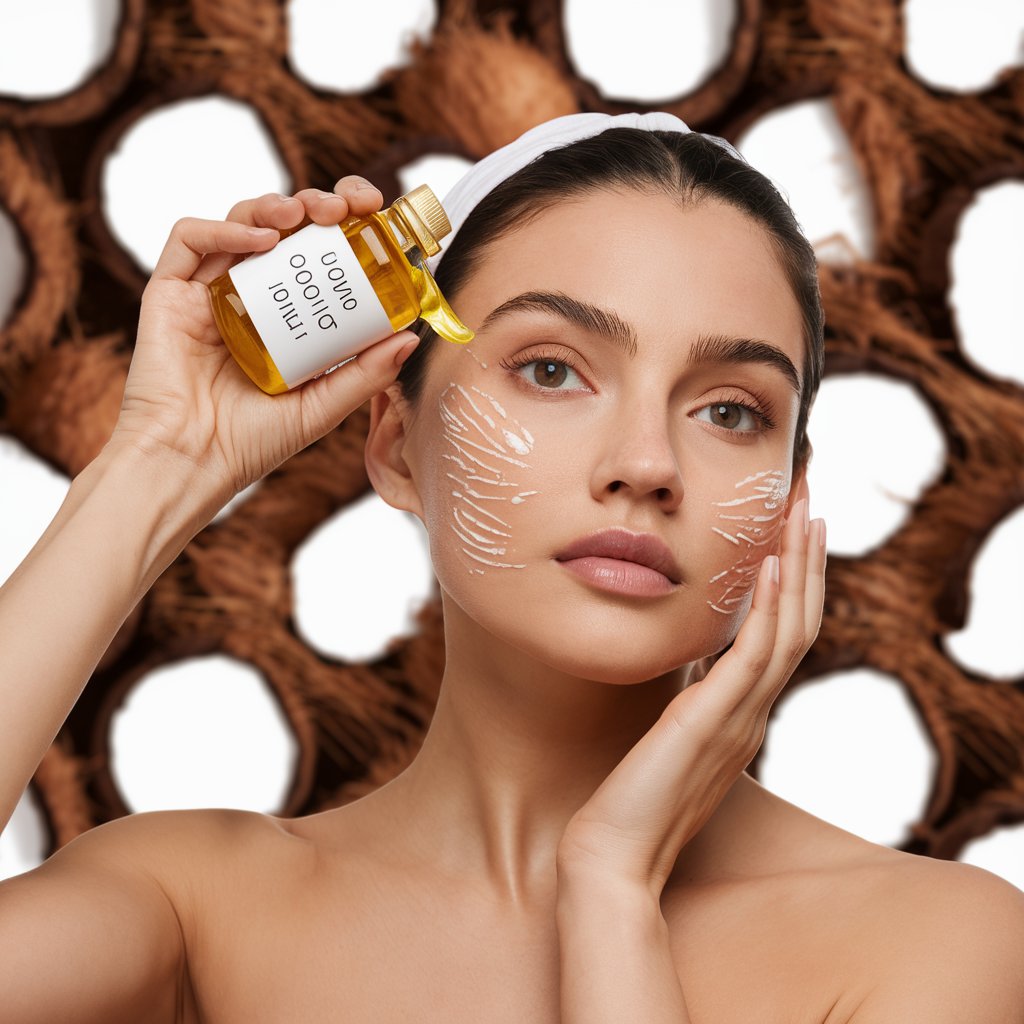Discover the truth about the effectiveness of coconut oil for skin lightening. Expert dermatologists and user experiences reveal mixed opinions. While it deeply moisturizes and enhances skin health, it lacks direct skin lightening properties.
Coconut oil is praised for its incredible moisturizing abilities and numerous other benefits.
But what about its role in skin lightening? Can this tropical treasure really help fade dark spots and even out your skin tone?
We’ll explore what industry experts, scientific researchers, and everyday users have to say about coconut oil and its potential for skin-lightening.
So, does coconut oil lighten skin? Grab a cup of tea and get comfortable as we uncover the truths and myths about using coconut oil for a brighter, more even complexion.
Industry Experts on Coconut Oil for Skin Lightening
Coconut oil is often touted as a natural remedy for a variety of skin issues, including skin lightening.
However, opinions from industry experts are mixed regarding its effectiveness for this purpose.
Let’s dive into what some of these experts have to say:
Hydrating properties
Dr. Patricia Wexler, a seasoned dermatologist, highlights coconut oil’s knack for hydration and skin smoothing.
However, she cautions that coconut oil doesn’t directly lighten skin tones, despite its temporary brightening effects. (1) (2).
Potential skin brightening effect
Pierre Michel Beauty experts suggest blending coconut oil with lemon juice and turmeric for potential skin-brightening benefits.
The experts reckon coconut oil helps these ingredients penetrate deeper, which could fade dark spots over time.(1).
Buoy Health also points out that while coconut oil soothes and moisturizes, it’s not your go-to for lightening skin.
For that, the source recommends products packed with active ingredients like saffron or turmeric to lighten the skin.(3).
Related: Natural Skin Lightening Ingredients You Never Knew Could Lighten Skin
Anti-inflammatory properties
Belle Beauties praise coconut oil’s anti-inflammatory and antioxidant powers.
The site suggest that coconut oil might help calm skin and fend off pigmentation issues.
However, the site is clear; more research is needed to lock down these benefits. (4).
Sue from Coconut Friends also explains that coconut oil makes your skin soft and glowy, but it may not help when it comes to lightening pigment.
In fact, overusing coconut oil could clog pores, especially for oily skin types. (Coconut Friends).
So, while coconut oil works wonders for hydration and skin health, don’t count on it for a fairytale skin lightening transformation!
Scientific Research on Coconut Oil for Skin Lightening
While coconut oil is popular for its moisturizing and healing abilities, its role as a skin-lightening remedy is still unknown.
Here’s a breakdown of what the research and experts have to say:
Antioxidant and Anti-inflammatory Properties:
Coconut oil contains beneficial fatty acids like lauric, capric, and caprylic acids. the oil also boasts antioxidants such as vitamin E and polyphenols, which can shield the skin from sun damage.
This helps in indirectly reducing pigmentation issues. Some studies suggest these qualities may aid in managing hyperpigmentation. (Cleveland Clinic) (Belle Beauties).

Potential Risks and Side Effects:
Dermatologists caution that coconut oil is highly comedogenic.
The oil could potentially clog pores and trigger acne, particularly for those with oily skin types. (Cleveland Clinic).
Limited Direct Evidence on effectiveness of coconut oil for skin whitening:
The components of coconut oil theoretically offer benefits for hyperpigmentation.
However, there’s limited direct scientific evidence supporting its efficacy as a skin-lightening agent.
Most perceived advantages stem from its ability to promote skin health and reduce inflammation rather than directly altering skin tone. (Coconut Seeds) (Cleveland Clinic).
Practical Use and Considerations:
For those keen on using coconut oil, experts recommend opting for pure, unrefined, cold-pressed varieties.
It can be applied as a body moisturizer or blended with other skincare products.
However, consistency and patience are crucial. any potential benefits are likely to manifest gradually (Belle Beauties)..
While it offers potential benefits such as mitigating hyperpigmentation, coconut oil is not a guaranteed solution for lightening skin. More rigorous scientific research is necessary to establish its efficacy of coconut oil for skin whitening.
User Experiences on Social Media and Forums
Here are YouTube videos where users share their experiences with using coconut oil for skin lightening:
How To Make Carrot & Coconut Oil for Skin Lightening:
In this video, the creator demonstrates how to make a skin lightening solution using carrot and coconut oil.
She explains how the combination can benefit different skin types. (https://www.youtube.com/watch?v=ZbDggn3CAtk).
Pure Coconut Oil Review:
This review focuses on the Pure Coconut Oil, discussing its application for skin care, including its potential for skin lightening.
The user shares personal insights and practical tips for incorporating it into a skincare routine.(https://www.youtube.com/watch?v=ZbDggn3CAtk).
Best DIY Oil for Skin Lightening
This video covers a DIY recipe for a skin-lightening oil that includes coconut oil.
The creator highlights the benefits of each ingredient and provides a step-by-step guide to making and using the oil.(https://www.youtube.com/watch?v=ZbDggn3CAtk).
Based on the videos, coconut oil may provide some benefits for skin lightening when used in combination with other ingredients.
Users report improved skin texture and hydration, which can give a brighter appearance.
However, results vary, and for significant skin lightening, other ingredients or methods may be needed.
Always conduct a patch test to ensure compatibility with your skin.
TikTok Testimonials on effectiveness of coconut oil for skin whitening
Here are TikTok videos where users share their experiences with using coconut oil for skin whitening:
DIY Skin Lightening with Coconut Oil:
Ron Chemist, a cosmetic chemist, explains that coconut oil is rich in saturated fats and essential fatty acids, making it a potent moisturizer for the body.
However, it can potentially clog facial pores, especially for those prone to acne.
Personal Experience with Coconut Oil:
This user discusses their personal experience using coconut oil for skin care.
They provide tips on how to apply it effectively and mention the importance of regular use for visible results. [Watch it here](https://www.tiktok.com/@blueberrymilkmob/video/7023076781642933509).
Based on these TikTok reviews, coconut oil appears to offer some benefits for skin health.
These benefits could indirectly contribute to a brighter and more even skin tone.
However, results vary, and significant skin lightening may require additional treatments or ingredients.
Consistency and proper application are key for seeing benefits over time.
Coconut oil for skin whitening: Forum Reviews and Discussions
Curious about what real people have to say about using coconut oil for skin lightening?
Here’s a look at some forum discussions and user reviews:
Reddit – r/SkincareAddiction:
One user tried coconut oil to fade dark spots and found it excellent for moisturizing and giving a healthy glow.
However, they didn’t see significant lightening of their spots. (Belle Beauties).
Reddit – r/AsianBeauty:
In a thread about natural remedies for hyperpigmentation, users had mixed experiences with coconut oil.
Some appreciated its ability to make skin look healthier and more hydrated.
Others saw little effect on dark spots and warned it might not be suitable for acne-prone skin (Coconut Seeds).
Acne.org Forums:
A user reported that coconut oil helped reduce redness and inflammation .
However, the oil didn’t significantly lighten hyperpigmentation. Other users recommended using it as part of a broader skincare routine rather than relying on it as the sole treatment for skin lightening. (Ashenly)..
Skincaretalk:
A user shared their experience of using coconut oil for several months, noting smoother skin and an improved overall tone.
However, their dark spots remained largely unchanged. (Nasola).
Makeupalley:
Reviews on MakeupAlley about coconut oil for skin lightening were varied.
Some users praised its moisturizing effects and slight improvements in skin tone, while others saw no significant changes in pigmentation.
Most agreed it’s better for general skin health than as a strong lightening agent .
From these discussions, it’s clear that coconut oil can boost overall skin health and hydration and possibly reduce minor blemishes and redness. However, its effectiveness as a standalone skin-lightening treatment is limited.
The Final Verdict: Is Coconut Oil Effective for Skin Lightening?
So, does coconut oil really lighten your skin?
Based on what the experts and users say, it seems like the answer is mostly no.
Coconut oil is fantastic for moisturizing and improving overall skin health. While it makes your skin look smoother and brighter, it doesn’t contain ingredients that directly lighten skin pigmentation.
Combining coconut oil with other natural ingredients like lemon juice or turmeric might help with skin brightening.
The idea is that coconut oil helps these active ingredients penetrate deeper into the skin.
Yet, it’s essential to note that this is more about the added ingredients doing the lightening work. Coconut oil only plays a supportive role.
Frequently Asked Questions (FAQs)
How Does Coconut Oil Help with Skin Lightening?
Coconut oil is often praised for its ability to moisturize and improve overall skin health.
This can give the appearance of a brighter complexion. However, it doesn’t directly lighten the skin.
Can Extra Virgin Coconut Oil Be Used for All Skin Types?
Extra virgin coconut oil is generally safe for most skin types due to its natural moisturizing properties.
However, it’s highly comedogenic, meaning it can clog pores and potentially cause breakouts.
How Often Should I Apply Coconut Oil for Best Results?
For best results, it’s recommended to use coconut oil as part of your daily skincare routine.
Applying it once or twice a day can help maintain hydration and improve skin texture.
Consistency is key, and any benefits, especially when using coconut oil with other skin-brightening ingredients, may take time to become noticeable.
Are There Any Side Effects of Using Coconut Oil on the Face?
While coconut oil is generally safe, it can cause some side effects, especially for those with sensitive or oily skin. It’s highly comedogenic, meaning it can clog pores and lead to breakouts.
Overuse might also result in skin irritation or allergic reactions in some individuals. Always conduct a patch test before applying coconut oil extensively on your face.
Can I Mix Coconut Oil with Other Essential Oils for Better Results?
Yes, you can mix coconut oil with other essential oils to enhance its benefits.
Combining it with oils like tea tree, lavender, or rosehip oil can help address specific skin concerns like acne, inflammation, or aging.
Tags:
Coconut oil for skin whitening
does coconut oil lighten skin?

I’m a devoted organic skincare enthusiast, passionate about the natural, wholesome goodness that organic products bring to our skin.
Organic skincare isn’t just a hobby for me—it’s a lifestyle. Every product I use, recommend, and write about has been carefully chosen for its purity and effectiveness. Everything I write about is backed by scientific studies, dermatologists’ opinions, and user experiences.
I also excel at tackling skincare challenges with innovative, organic solutions.


